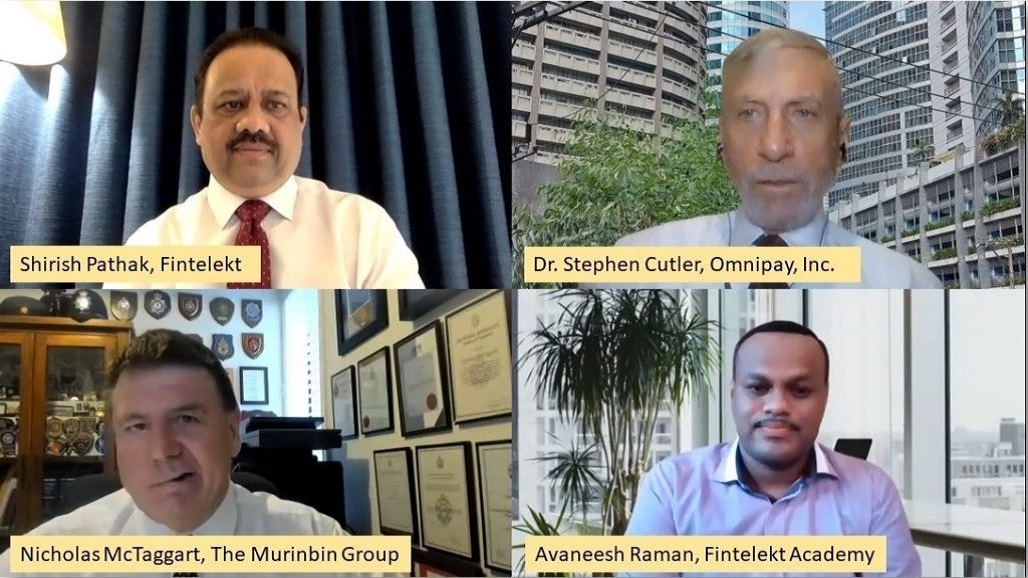The webinar on AML Enforcement Challenges hosted by Fintelekt Advisory Services in association with the Asian Bankers Association held on February 22, 2022 was a tremendous success. The first ABA-Fintelekt joint webinar of 2022 was marked by a record turnout with 1000+ participants registered from across 50 countries.
Moderated by Shirish Pathak, Managing Director, Fintelekt Advisory Services, the webinar featured Stephen P. Cutler, Chief Enterprise Risk and AML Officer, OmniPay, Inc., Nicholas McTaggart, Founder, The Murinbin Group, and Avaneesh Raman, Consultant – Fiji & Pacific.
The one-hour webinar featured a lively discussion among panelists who answered relevant questions from the audience.
Some key takeaways from the webinar are highlighted below:
(1) Enhanced AML/CFT risks observed due to the Covid-19 pandemic are:
- The rise of e-commerce activity has added a lot of risk because the persons behind the transaction are not known or seen. Such transactions become easy targets for fake and stolen identities, for frauds as well as money laundering.
- The utilization of alternate technologies and other channels (such as telegraphic money orders or PayPal) to transfer funds have grown as electronic fund transfers are relatively more traceable. Transaction amounts in such cases may be relatively small, but the costs are next to nil so they can be very cost effective and cost efficient. They are also conducive to activities such as smurfing and money mules.
- Drug shipments and changing modus operandi in trans-shipment routes have been an observed risk especially in the Pacific islands.
- Criminals are now moving more and more into manipulating and infiltrating the supply chains. The entities managing the supply chains are not obliged to report suspicious transactions and present a vulnerability to the system.
“While online payment platforms are great enablers and help in financial inclusion, they have brought on enhanced and heightened AML and fraud risks. We have seen enhanced dialogue and communication by regulators around this issue during the pandemic.” – Avaneesh Raman
Nicholas expounded on what he calls the ‘3 Ds’ during the pandemic:
(1.a) Disruption – the controls that were prevalent in financial institutions before the pandemic have become less valuable now.
(1.b) Desperation – individuals and small businesses have become vulnerable during the pandemic. Criminals have found it easier to recruit money mules or offer fake loans to businesses due to this disruption.
(1.c) Diversification – businesses have changed during the pandemic and financial institutions (FIs) now don’t know the customer as well as they may have done before the pandemic.
(2) Gaps in Enforcement
- Due to supervision moving online, supervisors have been restricted in their ability to get FIs to address deficiencies or enforce audits.
- There is a lack of ownership among FIs as very few are proactive and are taking steps to plug the gaps even without supervisory control.
- Travel restrictions have impacted cross-border investigations, which may be pushed to lower priority for law enforcement agencies.
- Supervisors and law enforcement agencies need to collaborate more and integrate their investigations with money laundering investigations, which is not happening in large measure.
(3) Common challenges across regulators and Law Enforcement Agencies (LEAs)
Financial Intelligence Units (FIUs) and LEAs are unlikely to look at more than a small proportion of the large number of reports that they receive. It is difficult for them to filter out the important ones from the noise.
Defensive Suspicious Transaction Reports (STRs/SARs) lead to a trust issue amongst LEAs if the STRs do not add much value and have to be investigated all over again. Public private information sharing alliances are useful for sharing value adding information but currently these do not comprise of all FIs and in fact leave out the smaller FIs who do not have the money or expertise to investigate.
“Don’t do defense reporting. Instead, get your analysts focused on the cases that are making the biggest impact to the institution itself. Follow up these cases with the regulator and remind them to look at these cases.” – Nicholas McTaggart
(4) Feedback on STRs filed by FIs
Notwithstanding privacy issues and the risk of compromising ongoing investigations, it would be useful for regulators to acknowledge that they have received the STR, which can become a part of the documentation maintained by the FI.
It would be also useful for FIs to be proactive and follow up on cases of concern (such as where there is a flight risk involved) and provide real time inputs to FIUs.
“When there’s no feedback, you lose your enthusiasm. You have to go by your patriotism or sense of duty, which can only take you so far. Pretty soon you start going through the motions.” – Stephen Cutler
A recording of the webinar is available on Fintelekt’s learning platform Fintelekt Academy HERE.
Registration on Fintelekt Academy, a learning portal on on-demand short training videos across a number of categories on AML/CFT issues, is free and more than 80% of the content is free to view HERE.


Leave a Reply